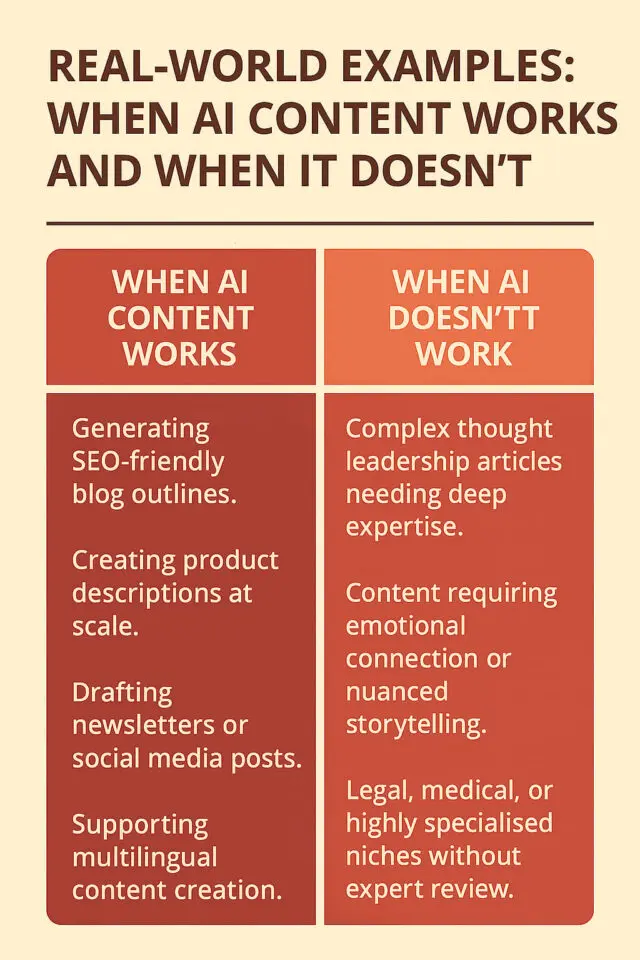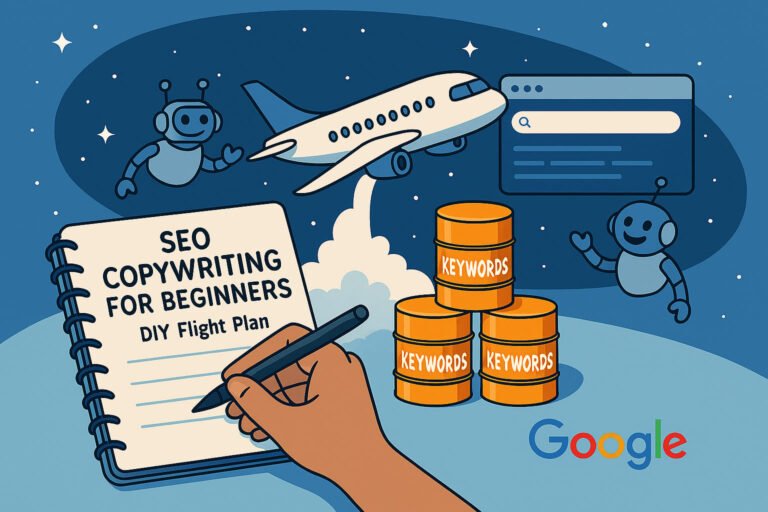I’ve been wanting to write about this topic because over the past few months, many people have been asking me the same question: “Is AI content bad for SEO?” And every time I’m about to answer, I find myself reflecting on how we arrived at this AI-powered SEO era.
I remember July 2021, just as we were emerging from the pandemic and my first book, “Serendipia de sueños”, was published. Back then, I lived in a world without AI, at least not in the way we experience it today. Sure, AI already existed before 2022, and companies like Google, Amazon, and Facebook were using it behind the scenes. But it wasn’t something people interacted with directly or consciously.
SEO was also very different. Then, in November 2022, OpenAI launched ChatGPT—the first conversational AI model to go viral thanks to its ability to generate coherent text, answer questions, and write content. In 2023, AI began to influence industries such as education, healthcare, marketing, programming, design, customer service, and more.
Now, in 2025, we’re witnessing how AI continues to evolve and innovate. This shift has pushed SEO specialists and SEO copywriters to adapt to “the new way of creating content”, not just to rank on search engines, but also on AI platforms.
So, this is where the question arises, and it’s exactly what we’ll explore in today’s post. But I won’t be the only one answering it. I’ve gathered valuable insights from several experts in the SEO and digital marketing world.
This is a fascinating topic that truly excites me; it’s a whole new world waiting to be discovered.
Keep reading and explore it with me…
What Is AI Content?
AI content refers to text generated by artificial intelligence tools using natural language processing (NLP) models. These tools analyse existing content, understand context, and then produce new written material, often with little to no human intervention.
Common AI content types include:
- Blog posts
- Product descriptions
- Social media captions
- Email newsletters
- Meta descriptions and SEO snippets
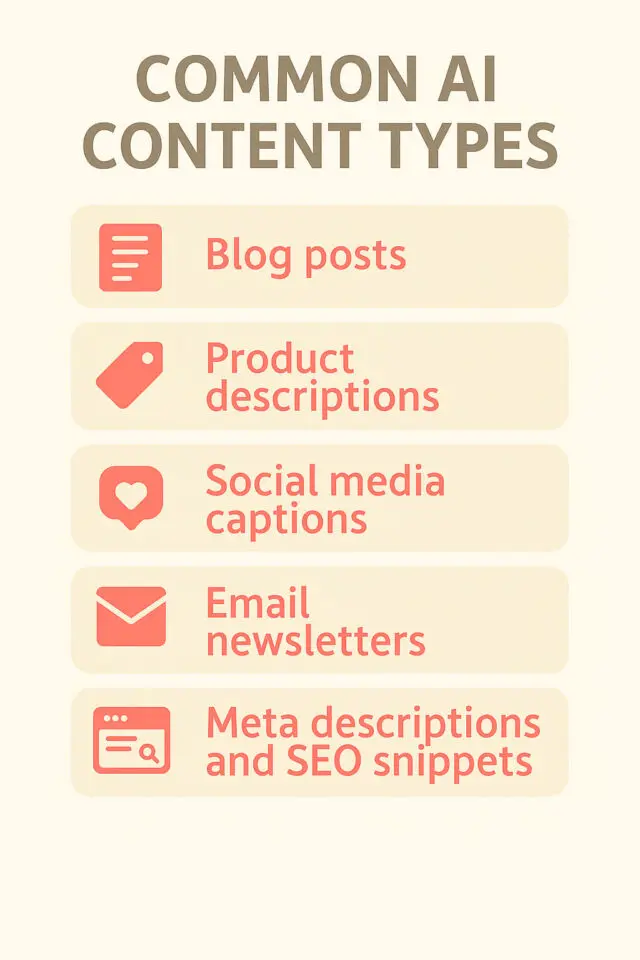
Common Misconceptions About AI Content and SEO
There are many myths surrounding AI content that confuse marketers and business owners:
- Myth 1: AI content is always low-quality and spammy.
- Myth 2: Google penalises all AI-generated content.
- Myth 3: AI content lacks originality and will cause duplicate content issues.
- Myth 4: Using AI content means your site won’t rank well.
The reality is more nuanced. Like any tool, AI content can be good or bad depending on how you use it.
How Search Engines View AI-Generated Content
Google’s stance on AI-generated content has evolved. The company’s main focus remains on delivering value and relevant content to users.
In their Search Central Blog, Google explains that content must primarily serve people, not search engines. This means:
- Quality matters above all.
- Content should be original and provide useful insights.
- AI can assist in content creation, but must be supplemented with human expertise.
Google does not automatically penalise AI-generated content but evaluates it based on its quality, usefulness, and originality.
Neil Patel, co-founder of Neil Patel Digital, explains:
“In traditional SEO, we optimized for keywords. In AI SEO, we optimize for entities. That means people, brands, products, or topics that AI can understand and connect together. Instead of just listing tools for ‘CRM software,’ AI answers now recommend tools that are known to work well for freelancers, appear in comparisons, and are mentioned in trusted sources. It’s all about context. If your site doesn’t clearly show what you do, who it’s for, and why you’re trusted, AI models won’t cite you — even if your content is technically optimized.”
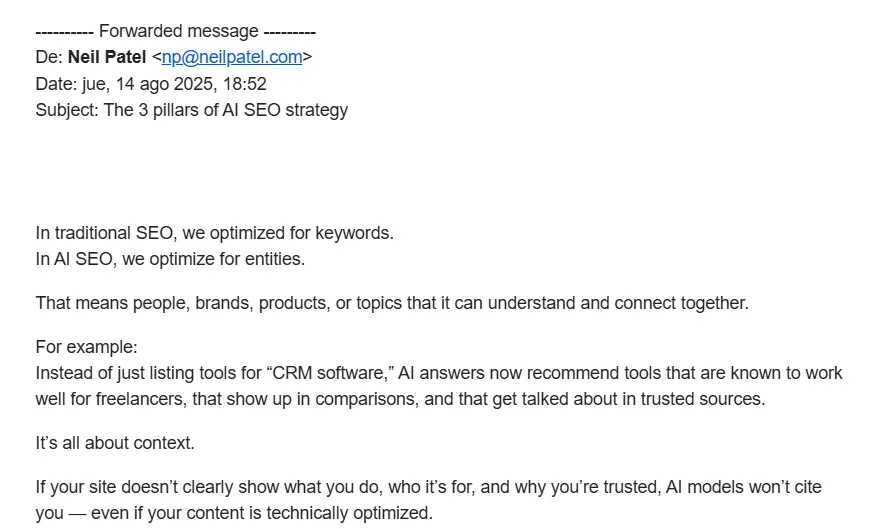
The Pros and Cons of Using AI Content for SEO
Pros
- Speed and Efficiency: AI tools can produce large volumes of content quickly.
- Cost-Effective: Reduces the need for extensive human resources initially.
- Idea Generation: Great for brainstorming topics and structuring content.
- SEO Optimisation: Some AI tools integrate keyword suggestions and meta optimisations.
Cons
- Quality Concerns: Without human review, AI content can be vague or inaccurate.
- Lack of Unique Voice: AI often produces generic tone unless tailored by an expert.
- Risk of Duplicate Content: AI models trained on existing content can inadvertently copy phrases.
- Algorithm Changes: Over-reliance on AI can backfire if search engines update their evaluation criteria.
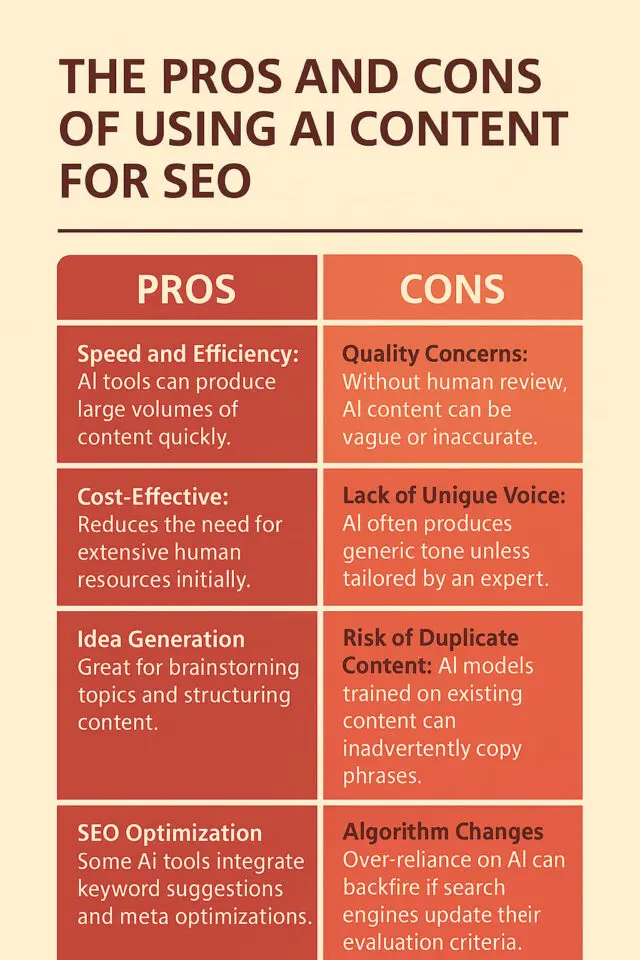
Pro tip: Always validate your AI-generated content with a seasoned SEO and copywriting expert, or use trusted platforms like SEOCOPYLAB that combine AI efficiency with expert oversight to ensure quality and compliance.
How to Use AI Content Effectively Without Hurting Your SEO
The key is to combine AI capabilities with human creativity and expertise. This topic has sparked widespread discussion among industry experts.
“75 % of PR specialists have started integrating AI into their workflows, up from 28 % in 2023… 60 % anticipate AI’s importance will continue to rise over the next five years.”
According to Dennis, founder of ESA Digital:
“To get listed on AI search, optimise for questions and concise answers on-page using Schema markup (Q&A). Experience is now essential for EEAT. Listicles (‘top’, ‘best’) and ratings are becoming key link-building sources. AI heavily relies on social signals and engagement, including Reddit, LinkedIn, Instagram, and YouTube. Data-driven PR with personal insights is crucial for AI mentions, and multilingual SEO is now a must-have for scaling globally.”
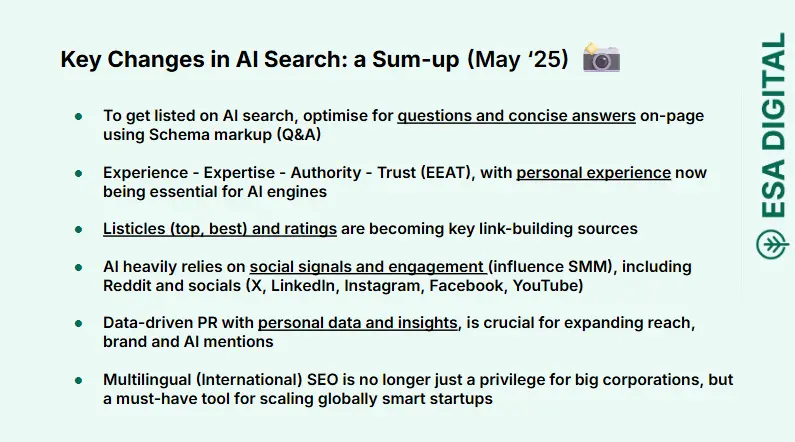
Based on insights from various SEO experts, here are some tips I’d like to share:
- Use AI for research, outlines, and drafts, but always edit and personalise your content.
- Validate facts and add unique insights that only you or your team can provide.
- Ensure the tone aligns with your brand voice and target audience.
- Run plagiarism and grammar checks before publishing.
- Incorporate relevant internal links to your existing content, such as this guide on SEO copywriting.
- Embed videos or infographics to enrich the content and improve user engagement.
- Use AI tools that offer expert validation and content optimisation (like SEOCOPYLAB).
AI Content and Google’s Guidelines: What You Need to Know
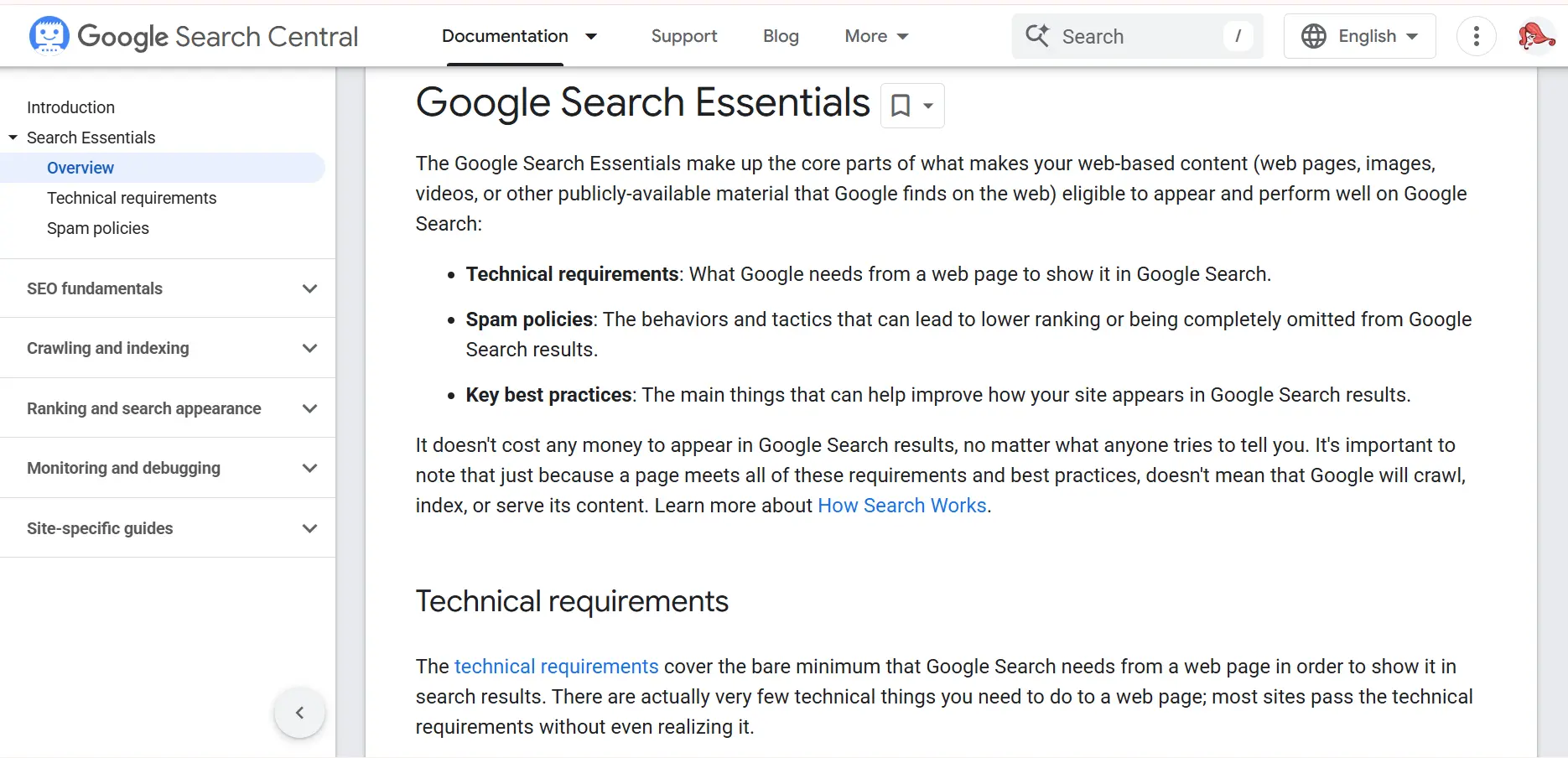
Google’s Webmaster Guidelines focus on helpful content and user experience. Important points for AI content creators:
- Avoid thin content that adds no value.
- Do not rely on AI to generate content that’s purely for search engines.
- Use AI as an assistant, not a replacement for genuine expertise.
- Follow the Google Quality Rater Guidelines for E-A-T (Expertise, Authority, Trustworthiness).
The Role of Human Expertise in AI Content
AI excels at handling data and patterns but lacks human empathy, creativity, and contextual judgement. A copywriter’s role remains crucial to:
- Inject personality and storytelling into your content.
- Ensure factual accuracy and relevance.
- Optimise for tone, style, and user intent.
- Align content with brand values and marketing goals.
Peter Rota, Elite SEO Specialist, warns:
“SEO is no longer about using a bunch of different tactics and hacks and just waiting for something to happen. You need marketing, psychology, copywriting, branding, content writing, AI and beyond. The industry is changing faster than ever, and SEO is not for the weak. But if you embrace AI and learn new skills, you can still make a career out of it.”
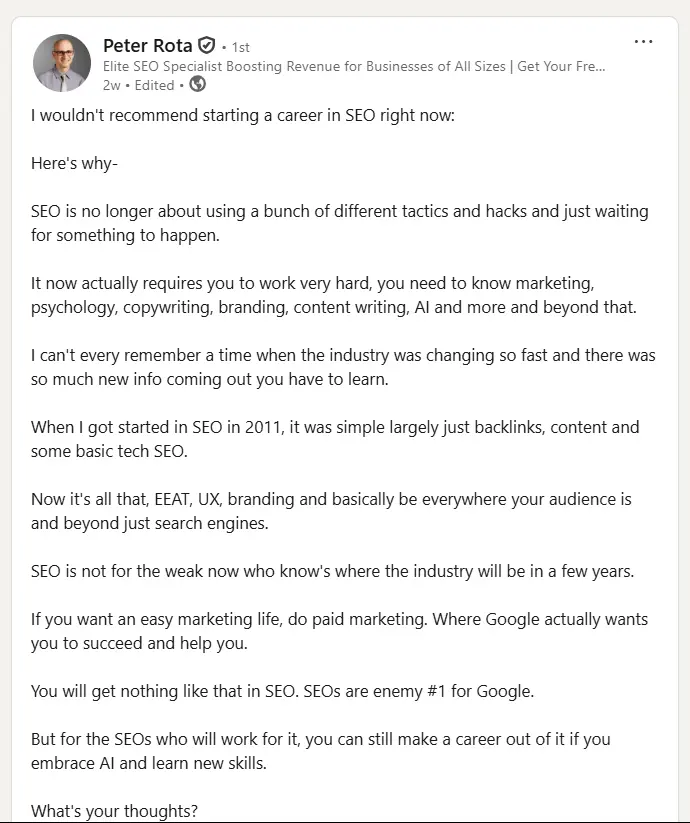
As the founder of SEOCOPYLAB, I believe that “we need a solution that integrates marketing, psychology, copywriting, branding, content writing, AI, and more to create SEO-optimised content.”, and Peter agreed.
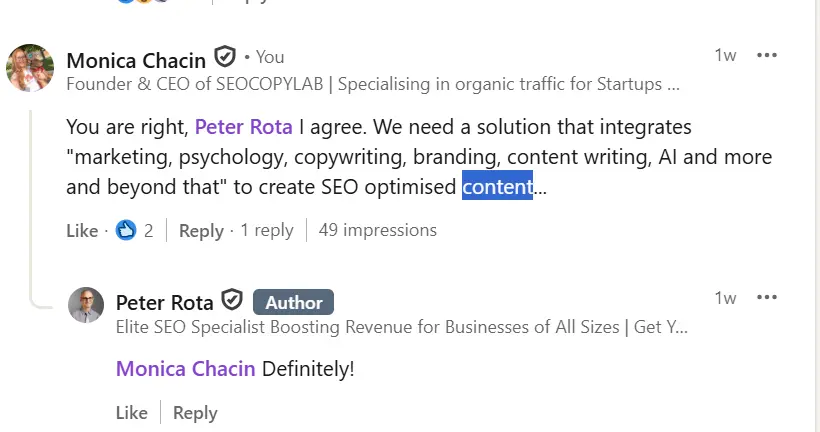
This makes me think that the future of SEO content isn’t about choosing between AI and human creativity, but about learning how to merge both intelligently.
Real-World Examples: When AI Content Works and When It Doesn’t
When AI Content Works
- Generating SEO-friendly blog outlines.
- Creating product descriptions at scale.
- Drafting newsletters or social media posts.
- Supporting multilingual content creation.
When AI Content Doesn’t Work
- Complex thought leadership articles needing deep expertise.
- Content requiring emotional connection or nuanced storytelling.
- Legal, medical, or highly specialised niches without expert review.
How SEOCOPYLAB Supports Sustainable and Expert-Validated AI Content
At SEOCOPYLAB, we combine the power of AI with human SEO experts who validate and optimise every piece of content. Our platform not only creates SEO-ready content but also helps reduce your digital carbon footprint.
By choosing SEOCOPYLAB, you get:
- AI-assisted writing backed by expert review.
- Sustainable content creation practices.
- Seamless CMS integration for easy publishing.
- Tools designed specifically for startups and SMEs.
Discover more at seocopylab.ai.
The Future of AI Content in SEO or AI SEO
AI content is not inherently bad for SEO. It’s a powerful tool when used wisely. Combining AI with human expertise unlocks the best results, faster production, higher quality, and better rankings.
The future is about collaboration between AI and humans, not competition. By focusing on value, originality, and user experience, you can harness AI to boost your SEO without compromise.
As Vogue Business points out in their article about ecommerce sites in the AI Era:
“2025 is the year that search changed… brands must redefine their website strategies… intent-based, detailed product descriptions… technical readiness is also crucial.”
AI mode delivers direct, conversational answers… reducing user reliance on traditional search links… this shift could heavily disincentivize web content creation.
Both Neil Patel, Dennis and many other experts agree that the immediate future is about optimising not only for traditional search engines but also for AI conversational engines, where context, authority, and a crystal-clear value proposition are essential to be cited.
For example, this is a relevant statement from John Mueller regarding the relationship between artificial intelligence (AI) and SEO:
“AI is not replacing traditional search, but it is significantly influencing how search results are generated and evaluated.” — John Mueller, Google Search Central Live, Madrid, April 2025
This quote highlights how AI is transforming the generation and evaluation of search results, without replacing the traditional search system.
Additionally, in a post published on 21 May 2025 on the official Google Search Central blog, the importance of creating unique and valuable content for users is emphasised, particularly in the context of new AI-powered search experiences, such as “AI Overviews” and “AI Mode.” It is noted that Google’s primary goal remains helping people find original and useful content, regardless of how it is produced.
These statements underscore that, while AI is changing how search results are generated and presented, the focus remains on delivering high-quality content that meets users’ needs.
AI and SEO: A Conversation That’s Reaching Everyone
The conversation around AI-generated content and its impact on SEO is no longer limited to digital marketers and SEO experts. Families, people of all ages, researchers, and journalists are now joining the discussion. One of them is Karen Hao, a respected journalist and author of Empire of AI, who investigates the ethical and societal consequences of artificial intelligence.
In her reporting, Hao reveals that even some tech leaders are so concerned about the future shaped by AI that they’re choosing not to have children.
As Karen Hao notes in The Irish Times:
“The pursuit of AI becomes dangerous as an idea because it’s eroding people’s data privacy. It’s eroding people’s fundamental rights. It’s exploiting labour, but it’s humans that are doing that, in the name of AI.”
This growing awareness shows that AI is not just a technical issue, it’s a human one. And as we explore its role in content creation and search engine strategies, it’s essential to consider the broader implications for society.
And this is just one part of a much bigger conversation. We can continue exploring the impact of AI on content creation and digital marketing in future posts. Would you like that? Share your thoughts in the comments about AI and content creation, and let me know which topics you’d like to see covered on this blog next!
FAQs
Q1: Will Google penalise my site for using AI content?
No, Google does not penalise AI content by default. However, content must be helpful, original, and high quality.
Q2: Can AI content replace human writers?
AI assists writers but cannot fully replace human creativity and expertise.
Q3: How do I avoid duplicate content with AI?
Always edit and personalise AI-generated drafts, and use plagiarism checkers.
Q4: Should I include videos in my AI content?
Yes! Videos increase engagement and signal quality to search engines.
Final Tip:
If you’re ready to get your content working smarter with AI, explore our AI-powered SEO copywriting platform at seocopylab.ai.
Join us and discover how AI can enhance your SEO strategy. Let’s co-create content that works smarter, not harder!
See you in the next post!
